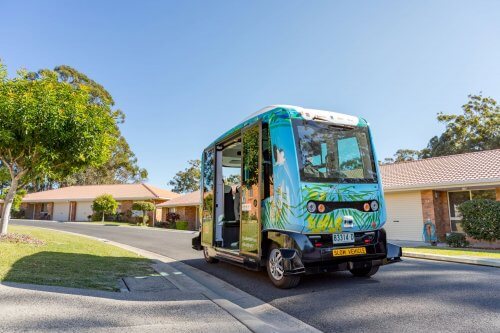Papercast solar-powered e-paper displays are an important part of the three-phase automated passenger vehicle trial
The first regional trial of an automated passenger vehicle service in Australia has moved into phase two, after a successful nine-week run on the Northern Breakwall in Coffs Harbour where 915km were covered and 5,014 passengers carried.
The project reported 86% satisfaction and 84% stated they would use such a service again.
Passengers benefit from live, accurate travel information at bus stops due to Papercast solar-powered e-paper displays using BetterETA technology.
The second phase of what is called the BusBot Automated Vehicle Service is underway with a more complex route featuring 36 stops at the Toormina’s Marian Grove Independent Living Village.
It is described as the first automated shuttle in the world to provide an on-demand service in an independent living village. Several elements of automated transport will be tested, including integration for the first time between an automated vehicle and an on-demand smartphone Via app.
“This trial is about understanding how automated vehicles can improve transport options in rural and regional communities,” said Byron Rowe, Managing Director of Busways, which is operating the vehicle.

“We will answer questions on how the vehicle meets various mobility needs, how an older community interacts with the technology, and how the community accepts driverless connected technology as a feasible transport option.
“Phase two is an extremely exciting phase of the project where we’ll see new technology integrations trialled for the first time.”
Papercast solar-powered e-paper bus stop displays provide BusBot controllers with a platform for direct real-time communication with customers at the bus stop.
The screens show live arrival times as well as information about the route, the driverless vehicles and the overall trial.
The controller can reassure customers in real-time, show additional service information and dynamically push notifications to a route or area.
The displays also come with a text to speech function, so with a push of a button it will announce the next service to arrive at the stop.
One Papercast display is permanently located at the Recreation Centre (town centre stop), with a second mobile display to be located at other stops so as many passengers as possible can experience the service.
“This initiative has the potential to transform the way communities think about and use public transport, and we are delighted to be involved with this cutting-edge project,” said Robert Bicket, CEO at Papercast.
“We believe that engaging passengers with valuable service information is at the heart of future transport, and this trial takes a major step forward in shaping the most successful model for autonomous transportation of the future.”
The automated passenger vehicle trial is an NSW (New South Wales) Government initiative, led in partnership between Transport for NSW’s Smart Innovation Centre, local bus operator Busways, Coffs Harbour City Council and vehicle manufacturer EasyMile.
The trial aims to revolutionise the way passenger transport services are designed and delivered in rural and regional communities. This is a three-phase trial where the technology is tested in more complex environments as the trial progresses.

